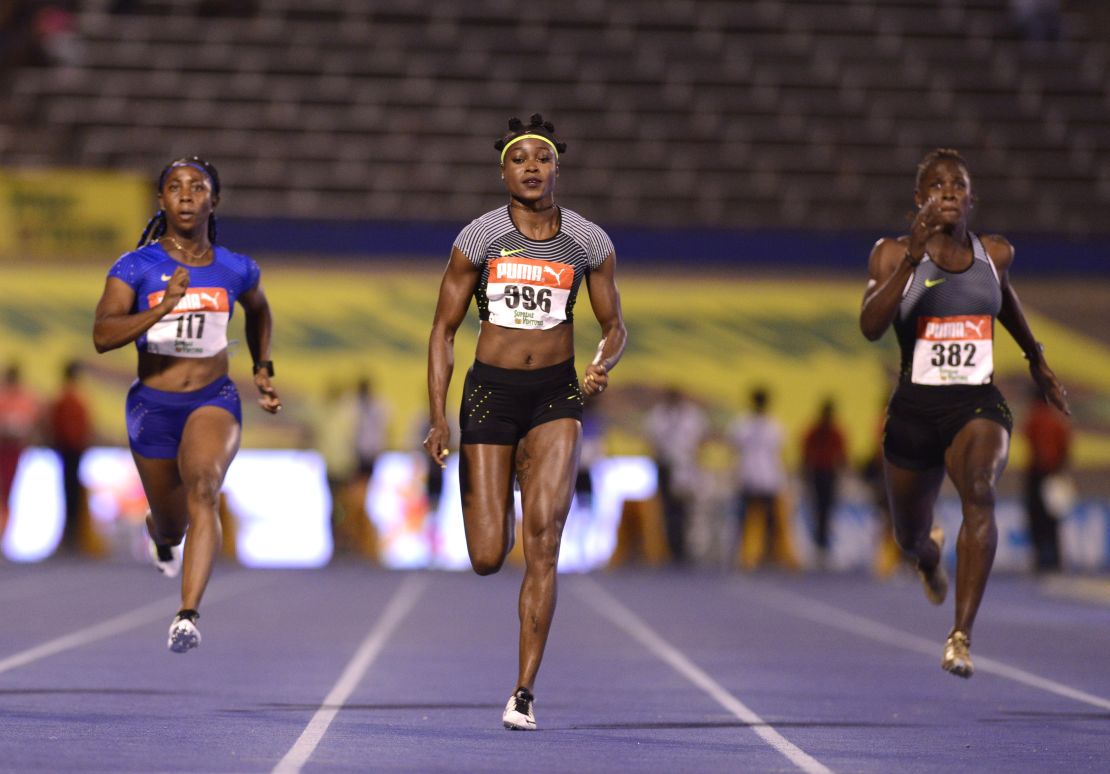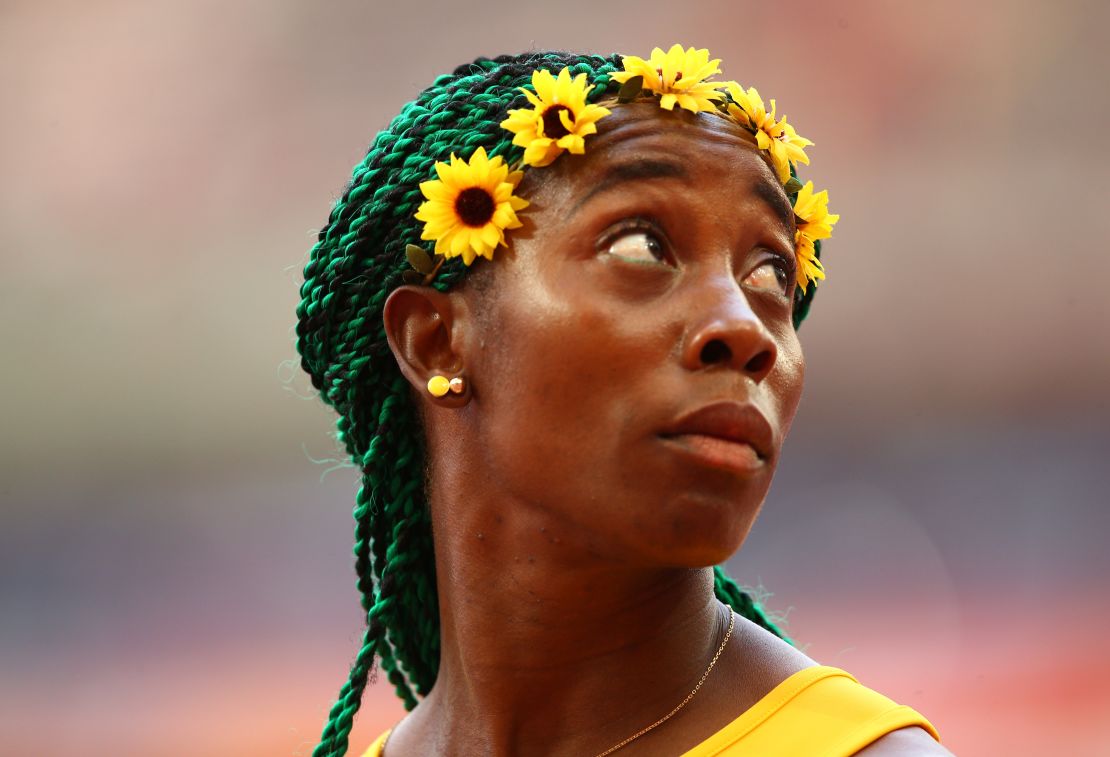Story highlights
Fraser-Pryce aims for third 100m gold
Can reach landmark before Usain Bolt
Not running 200m due to toe injury
Heading back to college after Olympics
If she beats Usain Bolt to sprinting history, she will do it with her own porridge.
Shelly-Ann Fraser-Pryce is in a Jamaican supermarket when CNN reaches her. She’s stocking up for her pre-Games camp in Italy. A full third of her baggage on the flight will be food from home.
“I have to make sure I’m not having too much pizza,” the 29-year-old winner of two straight Olympic women’s 100 meters titles says. “I carry stuff from here with me – my granola bars, my porridge, my milk, my sausages, my crackers, my chips, everything.
“That way, I know what I’m eating.”
Read: Bolt withdraws from Jamaica’s Olympic trials
Maybe it’s the suspicious mind of a woman caught out once before, in 2010, when a banned (but not performance-enhancing) painkiller turned up in her urine sample and earned her a six-month suspension. But then, maybe she just really likes the food she makes in Jamaica.
The porridge sachets are coming to Rio, too – where they could form the ultimate breakfast of champions, if Fraser-Pryce wins a third consecutive 100m gold.
She would be the first Olympian to do so, with her final the night before compatriot Usain Bolt hopes to complete the same feat. Make the final, cross that line in first place, and she will beat her illustrious Jamaica teammate to at least one spot in the history books.
“At least I’d have something over him!” she giggles.
Read: How will Russia’s ban affect Olympics medal table?
At precisely five-foot tall, Fraser-Pryce is so firmly, literally, installed within the shadow of six-foot five-inch Bolt that journalists cannot get away from the comparison.
The winner of the past two men’s 100m Olympic gold medals is a superstar, one of the world’s most recognizable athletes. He makes a handful of appearances each year and retains the aura of the untouchable, even when the data suggests he is by no means certain to win again in Rio.
Fraser-Pryce, who also triumphed in Beijing 2008 and London 2012, matches Bolt medal for medal over 100m at the Olympics and world championships. Somehow, that isn’t common knowledge.
“I’m over it,” she sighs. “Usain is a tremendous athlete. He’s the greatest athlete the world has seen – he has that, nobody can take that away from him.
“But female athletes have also done great things.”
Fraser-Pryce wants more recognition for her gender’s sporting achievements, not just hers.
In the meantime, beating Bolt to a sprint treble will do. “We’ve never spoken about it, but of course I’d like to to have that,” she chuckles. “So I can tell him I have something he wants.”
Scoring that little victory over Jamaica’s sprinting giant will require conquering a troublesome toe injury.
Fraser-Pryce is not used to dealing with this. In a decade of elite running, she has barely been injured: A small knee problem in 2014 and now this, more serious issue with a toe on her left foot.
Read: Rio police tell tourists they won’t be able to protect them
“On a pain scale of one to 10, about an eight,” she frankly admits. For anyone prepared to dismiss a toe injury as minor, eight out of 10 is a pretty high score coming from an Olympian.
“There’s restriction in the movement of my toe, it’s inflamed, and it causes a lot of pain. Right now I have a toe straightener on, and I also cushion my toe whenever I’m training,” she says.
“The pain is there, but to be honest I’m working through it. I guess that’s what success is, when you want something more than anything else.” Again, she deflects the issue with a joke: “As long as I know it’s not going to break, I’m fine.”

But the toe is already causing considerable disruption to a season Fraser-Pryce has described as “trying.” At Jamaica’s Olympic trials, she dropped out of contention in the 200m and will now contest only the 100m in Rio.
“Mentally, I was nervous, you know? I was worried,” she admits of this month’s trials, where she was runner-up in the 100m. “The only way I get to Rio to defend my title is coming through the national championships, and our national championship is tough. I just tried to make sure I did enough in each round.
“I knew, because of how bad the toe was, that the 200m was a big risk, but I haven’t been racing much and I needed that race. I needed to know where and what I could do. So I ran the first round more as an assessment than anything else, to see how the pain felt coming around the corner.
“And the pain was bad. So I decided, you know what? I’m just doing the 100m.
“I’m disappointed. Last year, my coach decided to have me not do the 200m so I could focus on the 100m. This year I was going to go back to focusing on both, and then this happened. But at the same time, I’m so grateful to be able to do something rather than nothing.”

Fraser-Pryce is always doing something. She already has a cafe at her home track, alongside a local hair salon – and hair is a fixation of hers.
At last year’s world championship final in Beijing, Fraser-Pryce wore a vibrant ensemble of yellow flowers and green braids as she beat Dutch rival Dafne Schippers by 0.05 seconds.
For Rio, she is undecided – but blue is a candidate.
Schippers, generally less follically experimental, is expected to be a menacing presence on the Rio start line. From the United States, English Gardner and Tori Bowie will provide competition. Jamaica trials winner Elaine Thompson has the year’s fastest time so far, and Fraser-Pryce – whose seasons often start slowly – has not yet shown the form she needs in Rio.
“I’m optimistic,” she says nonetheless. “I have faith that everything will work out.”
Read: Phelps qualifies for record fifth Olympic Games
Meanwhile, on top of her business interests, she is heading back to school after Rio resolves itself.
Fraser-Pryce has been accepted to study for a master’s degree in applied psychology at the University of the West Indies. She will combine her studies with the track (she has done that before, for her undergraduate degree) and wants to eventually start guiding younger Jamaican athletes.
“I would love to be able to help some of those athletes transition to elite athletes,” she says.
“I definitely believe our coaches are now leading more and learning more. They are hungry in terms of getting the athletes to improve. I believe it’s now more mental than anything else and I’d like to assist in that area.
“A master’s is a lot more work than my first degree but I’m an athlete who knows what she wants. I made up my mind and I’m determined that this is what I’m going to do.
“I love track and I love the platform that it gives me, but this is one platform that I also want to use to help our athletes and children here in Jamaica. I wish I had that.”
Fraser-Pryce didn’t have much growing up in Kingston. No nice house, is how she tells the story. No nice clothes. Not much self-esteem.
How, then, is it going to feel when she’s announced in Rio as the decade’s most dominant female sprinter?
“I try to understand that,” she says, thinking. “I never – in my dreams, doing track in high school, I didn’t imagine it would turn out like this.
Will Jamaica’s sprinters make more history in Rio? Have your say on our Facebook page
“When they announce who I am and what I’ve achieved, I still pinch myself to make sure I’m not dreaming. If I was dreaming” – another joke – “it would be a long dream.”
Returning to her Rio hopes, she adds: “That 100m would be exciting and so iconic. Not only for me, but as a female athlete to do it …
“And hopefully get in before Usain.”
















